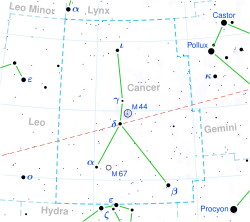Jota Cancri
| Jota Cancri (ι) | |
 | |
| Observationsdata Epok: J2000.0 | |
|---|---|
| Stjärnbild | Kräftan |
| Rektascension | 08t 46m 41,81988s[1] |
| Deklination | 28° 45′ 35,6190″[1] |
| Skenbar magnitud () | 4,02 [2] |
| Stjärntyp | |
| Spektraltyp | G8IIIa Ba0.2 [3] + A2V [4] |
| Astrometri | |
| Radialhastighet () | 15,74 ± 0,13 [5] km/s |
| Egenrörelse (µ) | RA: -21,58 ± 0,75 [1] mas/år Dek.: -45,69 ± 0,56 [1] mas/år |
| Parallax () | 9,85 ± 0,61[1] mas |
| Avstånd | 330 ± 20 lå (102 ± 6 pc) |
| Absolut magnitud () | -0,79 [6] |
| Detaljer | |
| Massa | 3,43 [7] M☉ |
| Radie | 21 [5] R☉ |
| Luminositet | 204 [5] L☉ |
| Temperatur | 4 954 [6] K |
| Metallicitet | -0,14 [5] |
| Vinkelhastighet | 170 [8] |
| Andra beteckningar | |
| 48 Cancri Jota Cancri A : HR 3475, HD 74739, BD + 29 ° 1824, HIP 43103, SAO 80416 Jota Cancri B : HR 3474, HD 74738, BD + 29 ° 1823, HIP 43100, SAO 80415 | |
Jota Cancri (ι Cnc, ι Cancri), som också är stjärnans Bayerbeteckning, är en dubbelstjärna i stjärnbilden Kräftan. Den är belägen omkring 300 ljusår från solen. De två stjärnorna i ι Cancri är separerade med 30 bågsekunder med endast långsam förändring. Även om ingen omloppsbana har observerats, visar de två stjärnorna en stor gemensam rörelse som antas vara gravitationsrelaterad.[9]
Egenskaper
[redigera | redigera wikitext]Den ljusare stjärnan, ι Cancri A, är en gul ljus jättestjärna av spektraltyp G med en skenbar magnitud på 4,02. Den är en mild bariumstjärna som antas bildad genom massöverföring av anrikat material från en stjärna i asymptotiska jättegrenen till en mindre utvecklad följeslagare. Ingen sådan givare har upptäckts i ι Cancri-systemet, men det antas att det finns en osynlig vit dvärg.[10]
Den svagare av de två stjärnorna ι Cancri B, är en vit dvärg i huvudserien av spektraltyp A med en skenbar magnitud på 6,57. Den är en skalstjärna, omgiven av material utkastat genom dess snabba rotation.[11]

Källor
[redigera | redigera wikitext]- Den här artikeln är helt eller delvis baserad på material från engelskspråkiga Wikipedia, tidigare version.
Referenser
[redigera | redigera wikitext]- ^ [a b c d e] Van Leeuwen, F. (2007). "Validation of the new Hipparcos reduction". Astronomy and Astrophysics. 474 (2): 653. Bibcode:2007A&A...474..653V. doi:10.1051/0004-6361:20078357.
- ^ Mermilliod, J.-C. (1986). "Compilation of Eggen's UBV data, transformed to UBV (unpublished)". Catalogue of Eggen's UBV data. Bibcode:1986EgUBV........0M.
- ^ Keenan, Philip C.; McNeil, Raymond C. (1989). "The Perkins catalog of revised MK types for the cooler stars". Astrophysical Journal Supplement Series. 71: 245. Bibcode:1989ApJS...71..245K. doi:10.1086/191373.
- ^ Grenier, S.; Baylac, M.-O.; Rolland, L.; Burnage, R.; Arenou, F.; Briot, D.; Delmas, F.; Duflot, M.; Genty, V.; Gómez, A. E.; Halbwachs, J.-L.; Marouard, M.; Oblak, E.; Sellier, A. (1999). "Radial velocities. Measurements of 2800 B2-F5 stars for HIPPARCOS". Astronomy and Astrophysics Supplement. 137 (3): 451. Bibcode:1999A&AS..137..451G. doi:10.1051/aas:1999489.
- ^ [a b c d] Massarotti, Alessandro; Latham, David W.; Stefanik, Robert P.; Fogel, Jeffrey (2008). "Rotational and Radial Velocities for a Sample of 761 HIPPARCOS Giants and the Role of Binarity". The Astronomical Journal. 135: 209. Bibcode:2008AJ....135..209M. doi:10.1088/0004-6256/135/1/209.
- ^ [a b] [ Kovtyukh, V. V.; Chekhonadskikh, F. A.; Luck, R. E.; Soubiran, C.; Yasinskaya, M. P.; Belik, S. I. (2010). "Accurate luminosities for F-G supergiants from FeII/FeI line depth ratios". Monthly Notices of the Royal Astronomical Society. 408 (3): 1568. Bibcode:2010MNRAS.408.1568K. doi:10.1111/j.1365-2966.2010.17217.x.7]
- ^ Takeda, Yoichi; Sato, Bun'ei; Murata, Daisuke (2008). "Stellar Parameters and Elemental Abundances of Late-G Giants". Publications of the Astronomical Society of Japan. 60 (4): 781. Bibcode:2008PASJ...60..781T. doi:10.1093/pasj/60.4.781.
- ^ Royer, F.; Grenier, S.; Baylac, M.-O.; Gómez, A. E.; Zorec, J. (2002). "Rotational velocities of A-type stars in the northern hemisphere. II. Measurement of v sin i". Astronomy and Astrophysics. 393 (3): 897. Bibcode:2002A&A...393..897R. doi:10.1051/0004-6361:20020943.
- ^ Eggen, Olin J. (1994). "Photometry of F-K type bright giants and supergiants. 3: The luminosity, reddening, and heavy element abundance of GK stars". The Astronomical Journal. 107: 2184. Bibcode:1994AJ....107.2184E. doi:10.1086/117030.
- ^ Eggleton, P. P.; Tokovinin, A. A. (2008). "A catalogue of multiplicity among bright stellar systems". Monthly Notices of the Royal Astronomical Society. 389 (2): 869. Bibcode:2008MNRAS.389..869E. doi:10.1111/j.1365-2966.2008.13596.x.
- ^ Hauck, B.; Jaschek, C. (2000). "A-shell stars in the Geneva system". Astronomy and Astrophysics. 354: 157. Bibcode:2000A&A...354..157H.
Externa länkar
[redigera | redigera wikitext]- https://www.universeguide.com/star/iotacancri
- https://web.archive.org/web/20170420045939/http://www.starobserver.eu/multiplestars/iotacancri.html
- http://stars.astro.illinois.edu/sow/iotacnc.html





